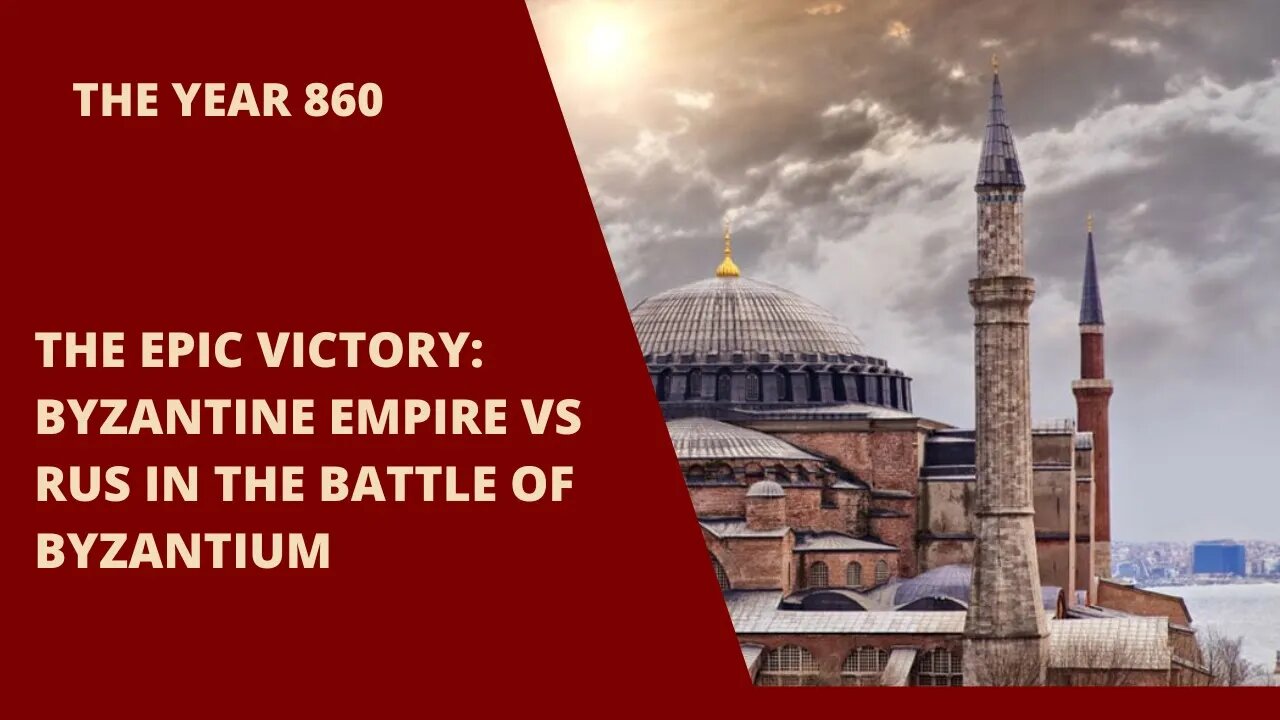Premium Only Content

The Epic Victory Byzantine Empire vs Rus in the Battle of Byzantium #history
#Past, #Heritage, #Tradition, #Ancestry, #Legacy, #Culture, #Civilization, #Chronicle, #Timeless, #Antiquity, #Annals, #Memorabilia, #Remembrance, #Yesterday, #Retrospect, #Nostalgia, #Archeology, #Historic, #Historicity, #Mythology, #Folklore, #Historiography, #Paleontology, #Epitaphs, #Lineage, #Roots, #Genealogy, #Museums, #monuments
The Epic Victory Byzantine Empire vs Rus in the Battle of Byzantium #history
In the late 10th century, the Byzantine Empire faced a massive invasion by the Rus. The Battle of Byzantium was fought between the two great powers, which lasted for seven days and resulted in an epic victory for the Byzantine Empire. The battle was a turning point in the history of the Byzantine Empire, as it marked the end of the Rus's military dominance and established the strength and power of the Byzantine Empire. The Byzantines used their tactical brilliance and advanced weaponry to defeat the Rus army, which was known for its fierce fighting skills and bravery. The Battle of Byzantium was fought near the city of Constantinople, and it remains an iconic event in the history of the Byzantine Empire. This video delves into the details of the battle, providing a comprehensive analysis of the strategies employed by the Byzantines and the reasons behind their stunning victory. If you're interested in history and warfare, this video is a must-watch! It's packed with fascinating insights into one of the most significant battles in Byzantine history.
History is a broad term that refers to the study and interpretation of past events and their significance to the present day. It encompasses the actions, beliefs, and experiences of human beings throughout time, as well as the physical artifacts and records that document these events. The study of history helps us to understand how the world we live in today has been shaped by past events and how we can learn from them.
The importance of history cannot be overstated. By examining past events, we can learn from the successes and failures of those who came before us, and apply this knowledge to our own lives and society. It helps us to understand the roots of current political, economic, social, and cultural issues and how they have evolved over time. History can also help us to appreciate the diversity of human experience and the many ways in which people have interacted with one another throughout history.
One of the key methods used in the study of history is the interpretation of primary sources. These can include written records, such as letters, diaries, and official documents, as well as physical artifacts like artwork, tools, and architecture. By examining these sources and analyzing them in context, historians can gain insights into the beliefs, values, and motivations of past peoples and societies. This can help us to understand the complexities of human behavior and decision-making, as well as the impact of larger social, economic, and political forces.
Another important aspect of the study of history is the consideration of multiple perspectives. This involves taking into account the viewpoints of different groups of people, such as women, minorities, and those who have been historically marginalized or excluded from mainstream narratives. By doing so, historians can gain a more complete picture of past events and the ways in which they have affected different communities.
In addition to its academic importance, history also plays a crucial role in shaping our collective memory and identity as a society. By remembering and commemorating important events and figures from the past, we can create a shared sense of history and belonging. This can help us to build stronger communities and foster greater empathy and understanding between different groups of people.
Overall, the study of history is essential for understanding ourselves, our world, and our place in it. Through careful analysis of past events and sources, we can gain insights into the complexities of human behavior and decision-making, appreciate the diversity of human experience, and learn from the successes and failures of those who came before us.
-
 14:38
14:38
A Small Part of History
2 months ago $0.01 earnedOccult Warfare: The Third Reich’s Dark Secrets and Operation Werewolf
461 -
 8:16
8:16
MattMorseTV
15 hours ago $6.14 earnedTrump’s name just got CLEARED.
57.5K56 -
 16:43
16:43
GritsGG
15 hours agoThey Buffed This AR & It Slaps! Warzone Loadout!
6.95K1 -
 2:05:30
2:05:30
Side Scrollers Podcast
19 hours agoEveryone Hates MrBeast + FBI Spends $140k on Pokemon + All Todays News | Side Scrollers Live
101K11 -
 11:06
11:06
The Pascal Show
13 hours ago $1.06 earned'THEY'RE GETTING DEATH THREATS!' Jake Haro's Lawyer Breaks Silence On Emmanuel Haro's Disappearance!
8.89K -
 LIVE
LIVE
Lofi Girl
2 years agoSynthwave Radio 🌌 - beats to chill/game to
385 watching -
 2:19:32
2:19:32
Badlands Media
1 day agoDEFCON ZERO Ep. 005: False Flags, Cyber Fronts & Global Power Plays
146K59 -
 2:35:23
2:35:23
FreshandFit
8 hours agoWhy Black Men Don't Date Black Women Debate
38.6K38 -
 2:03:42
2:03:42
Inverted World Live
12 hours agoBigfoot Corpse Coming to the NY State Fair | Ep. 94
108K27 -
 6:16:23
6:16:23
SpartakusLIVE
13 hours ago$1,000 Pistol Challenge || #1 ENTERTAINER of The EONS Eradicates BOREDOM
85.1K2